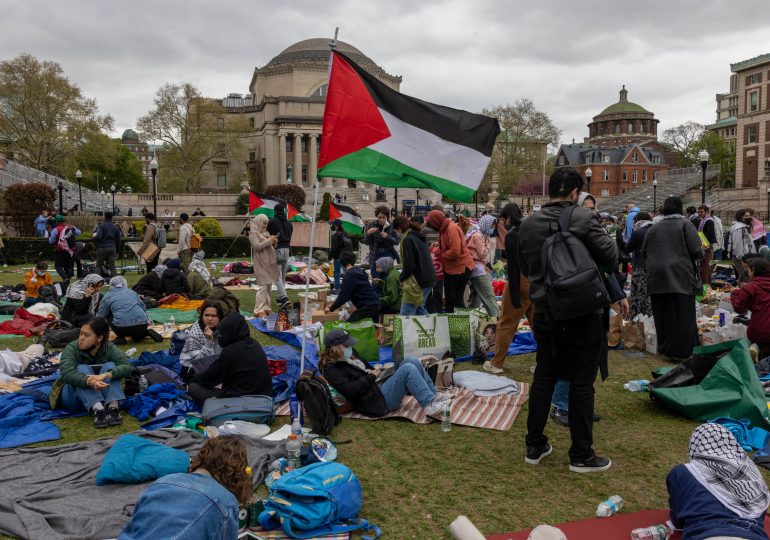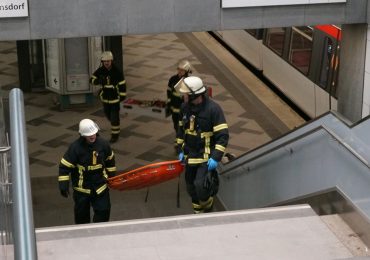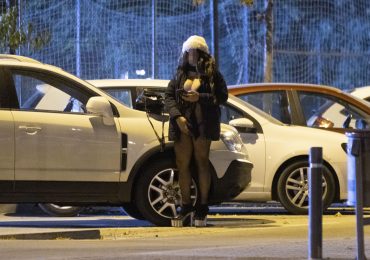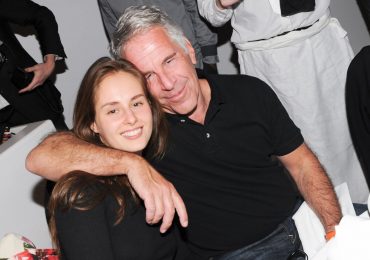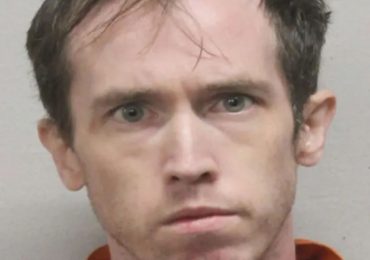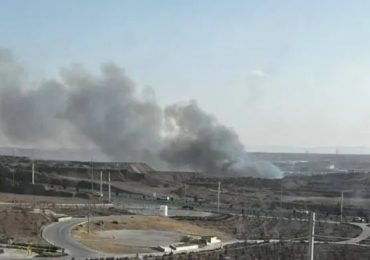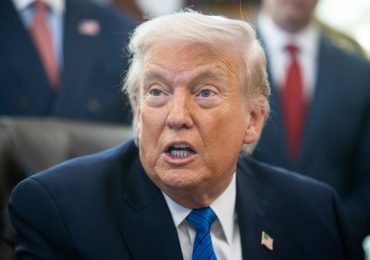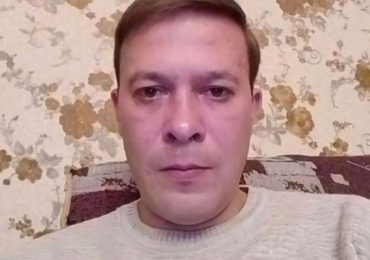One day after Columbia University called on law enforcement to arrest more than 100 pro-Palestinian protesters, students continued to occupy part of the campus lawn.
Dozens of police stood outside the university gates on Friday. Inside, it looks like a massive picnic. Chants from the loudspeaker go between “Free Palestine” and reminders to clean up and get food if protesters get hungry.
[time-brightcove not-tgx=”true”]
Marie Adele Grosso, a 19-year-old Barnard College student was among those arrested Thursday. She was back at the encampment Friday, wearing a keffiyeh, despite receiving an email telling her she was currently suspended on an interim basis. The college has not yet determined whether she has violated the Barnard College Student Code of Conduct.
Grosso says she is banned from campus housing, cannot use her meal plan and is unsure where she will stay for the night. University officials say she has 15 minutes to collect her belongings. But she’s determined to keep protesting. “The only moral thing is to do whatever we can,” she says.
Not everyone is on her side. Avi Lichtschein, a pro-Israeli protester, showed up outside the campus gates with an Israeli flag and his dog. “The days of Jewish people or Israeli people feeling intimidated are over. You can have your rally, it’s wonderful. I can hold my Israeli flag,” he says. Lichtschein, who grew up in New York and has relatives in Israel, says he is planning to move to Israel with his family in the near future. “It’s not out of fear, it’s more a sense of supreme pride,” he says. There are only a handful of counter-protesters; they are vastly outnumbered by hundreds of pro-Palestinian supporters.
A spokesperson for Columbia University said Friday that students who participated in the encampment are suspended but did not provide an exact number. “We are continuing to identify them and will be sending out formal notifications,” they said.
The spokesperson also stated that the encampment has been dismantled and they expect protests to continue. “We have rules regarding the time, place and manner that apply to protest activity and we will continue to enforce those,” the spokesperson said. While the tents are no longer set up, protesters appear to still have plans to sleep on the lawn. A large pile of blankets and sleeping bags sit on a blue tarp.
Read More: USC Faces Backlash Over Alleged ‘Censorship’ of Pro-Palestinian Valedictorian’s Speech
The New York Police Department arrested 113 people on Thursday. Charges included resisting arrest, obstructing governmental administration and disorderly conduct. The police were invited onto campus by President of Columbia, Minouche Shafik.
Shafik wrote in an April 18 letter to the New York City Police Department that the “encampment raises safety concerns for the individuals involved and the entire community.”
Police maintained that the protest was peaceful. “The students that were arrested were peaceful, offered no resistance whatsoever and were saying what they wanted to say in a peaceful manner,” said John Chell, NYPD Chief of Patrol. After police arrested students on Thursday, more protesters took their place in campus demonstrations. Some of those who were arrested returned.
The arrests marked the first time the university has called the cops on student protesters since 1968, during anti-war protests against the Vietnam War.
Isra Hirsi, the daughter of Rep. Ilhan Omar of Minnesota, posted on X Thursday that she was 1 of 3 Barnard College students who were suspended. Hirsi is an organizer with Columbia University Apartment Divest, a coalition of student organizations calling for Columbia to divest in Israel.
On Wednesday, Rep. Ilhan Omar grilled Shafik during a congressional hearing about antisemitism. Omar asked about an alleged chemical attack on pro-Palestinian protesters, as well as why students had been evicted and harassed. “There has been a rise in targeting and harassment against antiwar protesters,” Omar said Thursday.
Shafik said at Wednesday’s congressional hearing that the university had suspended 15 students. “Antisemitism has no place on our campus, and I am personally committed to doing everything I can to confront it directly,” she said.
Despite the arrests Thursday and requests from Shafik to disperse students, demonstrations continued Friday, with no signs of letting up.
Around 5 p.m., a few dozen Muslims prayed on the lawn; some used the Keffiyeh as a hijab. Their non-Muslim peers surrounded them with blankets to give them privacy.
Eliette, a graduate student at the Columbia School of Social Work and non-binary queer Korean, got arrested Thursday. (They asked for their surname to be withheld out of fear of getting doxxed.) “The NYPD said there were no threats; that says it all,” they said at the encampment on Friday. The protester says the movement has been “full of joy and camaraderie.” They say it was important to them not to be on the wrong side of history and mention that being an American citizen and living off-campus helps them feel more protected.
The Columbia Spectator’s editorial board slammed the university administration Thursday for “conflating pro-Palestinian campus activism with antisemitism” and failing to protect students. “Hundreds of campus affiliates stood witness as the NYPD disgracefully arrested over 100 of our classmates, friends, and colleagues for peacefully protesting,” they wrote.
At least three legal observers were arrested, according to Columbia University Apartheid Divest. They accused police of denying access to health services for a student who fainted outside of the encampment. The NYPD did not respond to a request to comment about these incidents.
Shafik said in an April 18 statement that she called law enforcement “out of an abundance of concern for the safety of Columbia’s campus.”
Celeste, an Arab Columbia University student, said Thursday during a press conference that the university’s response to protests made her feel unsafe. “Whose safety are we prioritizing when we call the police on campus?” she said. “It just seems at this point that Arab students are valued as less.” (Celeste asked to withhold her last name out of concern for her safety.)
Ilan Cohen, a Jewish Columbia student, said at the press conference that he is “horrified” by the implications these “crackdowns carry for (his) own safety.”
“The idea that censorship, repression, silencing, firing are occurring on our campus in the name of my safety doesn’t make me safe. It alienates me,” Cohen said. “If anything. I’m part of a growing group of young American Jews who are horrified and the actions of today solidified that beyond belief.”
Congressman Jamaal Bowman said at a Friday press conference that Columbia appears to be folding to pressure from right-wing Republicans to suppress freedom of expression. “Bringing in the NYPD to arrest students demonstrating for peace leads us down a very, very dark path,” he said.
Maryam Alwan, a Palestinian American and lead organizer of Columbia University’s Students for Justice in Palestine chapter, first arrived at the encampment at 4 a.m. Wednesday, ahead of Shafiq’s testimony before Congress. “I have never had such a communal experience in my entire life,” she says.
Alwan feels that the entire student body is enraged. “They’re losing control because we’ve been watching a genocide unfold on our screens every single day and they have ignored every Democratic means by which we have tried to make our voices heard,” she says. (Israel denies that a genocide is occuring but South Africa has brought a case of genocide to the International Court of Justice. )
Alwan says students watched a Palestinian film on a projection screen and people danced. Alwan keeps refreshing her email inbox, nervous that she may receive a suspension notification. So far, she has not. “I’m probably going to join the camp, regardless of whether or not I’m suspended,” she says.
Leave a comment
